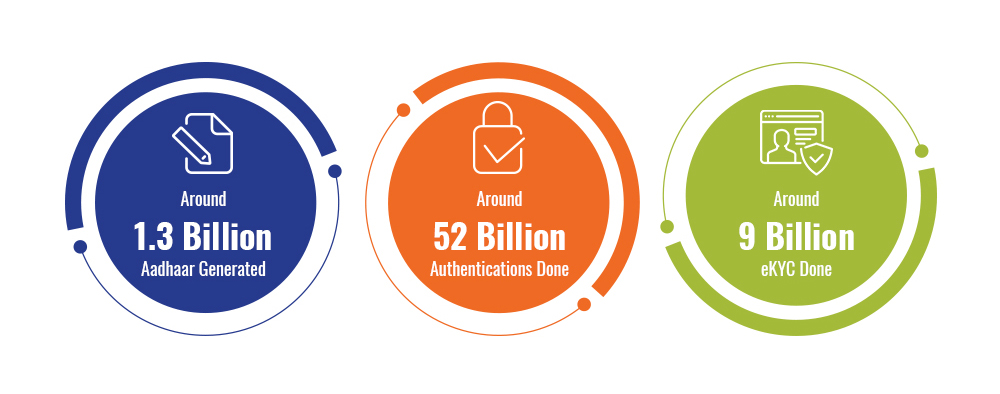India
Breadcrumb navigation
Connecting 1.3 billion Indians to a world of opportunities


It has become exceedingly important in today’s digital age to build trust, especially online. This builds the foundation for markets to thrive on. Establishing an agreed upon digital identity that can be used easily will be the cornerstone of future economies. In 2019, the World Bank estimated that around 1 billion people do not have, or cannot have access to official identity documents such as a passport and thus cannot prove their identity to open a bank account or start a job. Many more are believed to have documents which cannot be authenticated, resulting in exclusion from education, healthcare and society in general. Technology has made creating a clear framework of rules for a digital identity possible and has enabled businesses to innovate as well as help you access products and services with ease.
IDs are taken for granted by those who have them. But lack of indentification creates barriers for each individual affected and for the countries they live in.

Makhtar Diop
World Bank Vice President for Infrastructure
*Source: The World Bank
There are a number of identification systems across countries. For instance, Malaysia has a national identification system called MyKad, mandatory for all permanent residents. Malaysia also became one of the first countries to come up with biometric security information on a computer chip along with photo identification in one single card when introduced in 2001. The card also comes with a contactless funds transfer feature that can be used for making payments at public infrastructure places such as toll plazas, car parks and railway stations. Indonesia also has a national identity card called Karta Tanda Penduduk (KTP) available in a plain and an electronic version. The primary purpose of the card is identity verification, but is also being used to streamline bureaucratic processes. The Brazilian Association of Companies in Digital Identification Technology (ABRID) is responsible for running the national identification program in Brazil, and their identity cards are known to streamline bureaucratic processes and enhance citizen’s convenience by making use of a single card for all identification purposes. It is also a proof of citizenship unlike many other digital identifications.
India’s program to provide a unique identity number to every resident, Aadhaar is the largest biometric identification program in the world. The program aims to achieve social inclusion and more efficient public and private service delivery. Aadhaar has also started to be used for several public purposes, such as digitizing government subsidy flows, financial services, recording attendance for government employees to reduce absenteeism; and issuance of passports, voter identity cards and other forms of ID. It is differentiated from other digital identities due to its unprecedented, large-scale biometrics system. The system utilizes various biometrics such as fingerprints, face images and iris images to distinguish more than 1.3 billion Indian citizens. It also has tremendous processing power, with the capacity to handle more than 1 million registrations per day by checking the registered biometric information for more than 1 billion people and comparing it to the biometric information of people seeking to register.

Over the last decade, India’s Aadhaar has allowed millions to participate in the country’s economic life and has aided in eliminating duplicate, non-existent and fake beneficiaries. Providing a reliable digital identity, Aadhaar has unlocked more secure, seamless and reliable interactions online for individuals and organizations alike. With Aadhaar, India leapfrogged the identification systems of various developed countries, enabling access to public services that many had long been entitled to. Banks and mobile companies have enrolled poor people who previously had not been seen as viable customers.
The world is slowly inching towards a time when an individual’s online identities match their real-life identities and provide a global and accurate representation of who they are and what they do. With ever-evolving technologies coming up, this is going to become easier with time and fragmented digital identities will become even further streamlined, in turn ensuring social and economic benefits globally.
Read how NEC achieved this feat <https://bit.ly/2V78xoM>
Contact